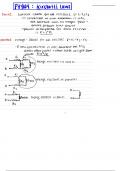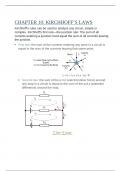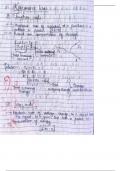Kirchhoff - Study guides, Revision notes & Summaries
Looking for the best study guides, study notes and summaries about Kirchhoff? On this page you'll find 64 study documents about Kirchhoff.
Page 3 out of 64 results
Sort by
Detailed notes regarding Kirchhoff rules, ammeters, and RC circuits including background, examples, and more.
An in-depth look into Kirchhoff's law an how it expresses the relationship between resistance, current and voltage.
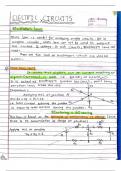
-
Class 12 physics notes on electrical circuits cover the principles and concepts related to the flow of electric current in various circuit configurations. Key topics include Ohm's Law, Kirchhoff's Laws, series and parallel circuits, resistors, capac
- Lecture notes • 62 pages • 2024
-
- £2.85
- + learn more
Class 12 physics notes on electrical circuits cover the principles and concepts related to the flow of electric current in various circuit configurations. Key topics include Ohm's Law, Kirchhoff's Laws, series and parallel circuits, resistors, capacitors, and inductors, as well as the analysis of complex circuits using techniques such as Thevenin’s and Norton’s theorems. The notes also explore the behavior of alternating current (AC) and direct current (DC) circuits, power dissipation, and...

-
Physics and Electromagnetism - Kirchhoff's Law with SOLVED Problems
- Lecture notes • 28 pages • 2023
-
- £6.52
- + learn more
This document serves as a comprehensive guide to mastering the foundational principles of Kirchhoff's Law and honing problem-solving skills in electrical circuit analysis. It meticulously breaks down the essence of Kirchhoff's Current Law (KCL) and Kirchhoff's Voltage Law (KVL), elucidating how these fundamental laws govern the behavior of currents and voltages within intricate circuits. With a clear and systematic approach, the document navigates through practical techniques for solving comp...
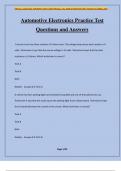
-
Automotive Electronics Practice Test Questions and Answers
- Exam (elaborations) • 33 pages • 2024
-
- £10.20
- + learn more
Automotive Electronics Practice Test Questions and Answers A series circuit has three resistors of 4 ohms each. The voltage drop across each resistor is 4 volts. Technician A says that the source voltage is 12 volts. Technician B says that the total resistance is 18 ohms. Which technician is correct? Tech A Tech B Both Neither - Answer-Tech A A vehicle has four parking lights all connected in parallel and one of the bulbs burns out. Technician A says that this could cause the parking l...
kvl and kcl, easy to learn with diagram

-
Kirchhoff's law and electrical measurement numerical solved
- Interview • 16 pages • 2023
-
- £4.48
- + learn more
Kirchhoff's law and electrical measurement numerical solved(Easy and Moderate level, marks 2-4) is useful for mainly Indian boards like CBSE, ISC, and +2 competitive exams. Great for concept development for everyone.
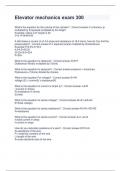
-
Elevator mechanics exam 300
- Exam (elaborations) • 10 pages • 2024
-
- £7.34
- + learn more
Elevator mechanics exam 300 What's the equation for the volume of the cylinder? - Correct answer-V (volume)= pi multiplied by R squared multiplied by the height Example: radius is 6" height is 30 V=3.1416•6•6•30 A drill draws a current (I) of 4.5 amps and resistance of 16.0 ohms, how do You find the power(watts)? - Correct answer-P=I squared (amps) multipled by R(resistance) Example:P=4.5•4.5•16.0 4.5•4.5=20.25 20.25•16.0=324 P=324 What is the equation for distance? - ...
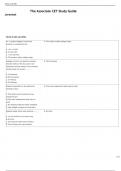
-
The Associate CET Study Guide Terms in this set (276) B+, or supply voltages in electronics products, is considered to be: A. +5 to +12 VDC B. 0 to 30 V DC C. +12 to 300 V DC D. The anode or plate voltage supply D. The anode or plate voltage supp
- Exam (elaborations) • 16 pages • 2024
- Available in package deal
-
- £6.28
- + learn more
The Associate CET Study Guide Terms in this set (276) B+, or supply voltages in electronics products, is considered to be: A. +5 to +12 VDC B. 0 to 30 V DC C. +12 to 300 V DC D. The anode or plate voltage supply D. The anode or plate voltage supply Leakage current in an electronic product, between either of the AC power cord conductors and the chassis or any exposed metals should not exceed _. A. 5 microamps B. 500 microamps C. 5 milliamps D. 50 milliamps B. 500 micr...
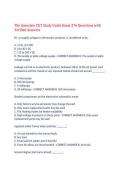
-
The Associate CET Study Guide Exam 276 Questions with Verified Answers,100% CORRECT
- Exam (elaborations) • 57 pages • 2024
-
- £10.60
- + learn more
The Associate CET Study Guide Exam 276 Questions with Verified Answers B+, or supply voltages in electronics products, is considered to be: A. +5 to +12 VDC B. 0 to 30 V DC C. +12 to 300 V DC D. The anode or plate voltage supply - CORRECT ANSWER D. The anode or plate voltage supply Leakage current in an electronic product, between either of the AC power cord conductors and the chassis or any exposed metals should not exceed _________. A. 5 microamps B. 500 microamps C. 5 millia...

Do you wonder why so many students wear nice clothes, have money to spare and enjoy tons of free time? Well, they sell on Stuvia! Imagine your study notes being downloaded a dozen times for £15 each. Every. Single. Day. Discover all about earning on Stuvia

